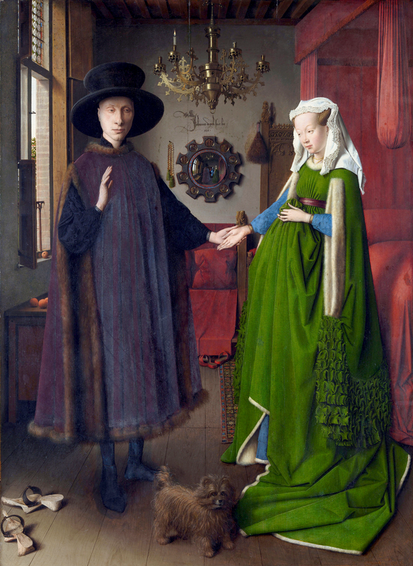 Arnolfini Wedding Portrait by Jan Van Eyck Arnolfini Wedding Portrait by Jan Van Eyck “For better or for worse, in sickness and in health, in good times and in bad….” The traditional wedding vows lay bare the meaning of faithfulness: to stand by the beloved in bright and bountiful times, and in privation and peril. “Faithless is he that says farewell when the road darkens,” J.R.R. Tolkien reminds us. Faithfulness (an attribute of both love and justice) is a hard virtue for us moderns. Contemporary culture prizes the individual and autonomy. Should we really be bound to each other or some abstract ideal in good times and in bad? For better or for worse? That’s fine for dogs, maybe, but what if such bonds seem to anchor us to a dead weight? Maybe we can learn something from dogs (the traditional symbols of fidelity in art). This month our K-6 literary selections feature the true story of Hachiko, the Akita companion of a Japanese professor. From 1923 to 1925, Hachi waited each day at the Shibuya Train station in Tokyo for his master to return from work. The young dog was daily rewarded with the embrace of Dr. Ueno, who showered him with affection and treats. But the professor’s sudden death in 1925 could not be explained to his canine companion. For the next ten years, until the end of his own life, Hachiko went daily to the train station to stand vigil for his master. Vendors and those who frequented the station fed and sustained him, but he would not be removed and died standing vigil. Only a dog would do that we think. And what good was it? He missed out on his whole life watching for someone who never came. Still, a bronze statue in front of the station honors his faithfulness and young couples pledge their love to each other before it. And, there is something in the human spirit that honors this sacrifice. Did he lose his life or find it? I have two friends (one on each coast) married for more than sixty years each, who are caring in the home for their physically failing husbands (92 and 85 respectively). The men both have dementia and are increasingly non-verbal and immobile. Neither woman leaves the home overnight anymore. Neither travels. Both rely on a network of family and friends to assist occasionally, but they are on duty 24-7 and living out what many of us think of as “for worse” in their 80s and 90s. And what strikes me about both these remarkable women is that neither complains, and both have a joyful spirit. “I took the good times. I’ll take the bad,” one of them told me. “I am so grateful for his life and that we're together,” said the other. To me it seems they have each become more fully themselves through their faithfulness, which in this case involves both service and sacrifice. Not everyone could do this, and not all spouses should, but faithfulness to the beloved, to our ideals, and our communities remains a timeless virtue. “We are born to unite with our fellow man and to join in community with the human race,” Cicero wrote. Could he have envisioned the faithfulness of women such as these? Or the example of our “heroine” this month, Annie Sullivan, who gave her whole life to make possible the full life and growth of Helen Keller? These role models "hold faithfulness and sincerity as first principles," and we are all better for it.  PS: My eighty-two-year-old friend and her eighty-five-year-old husband just adopted a puppy. Her name is Grace. Mary Beth Klee
0 Comments
Your comment will be posted after it is approved.
Leave a Reply. |
AuthorWrite something about yourself. No need to be fancy, just an overview. Archives
July 2024
Categories |
